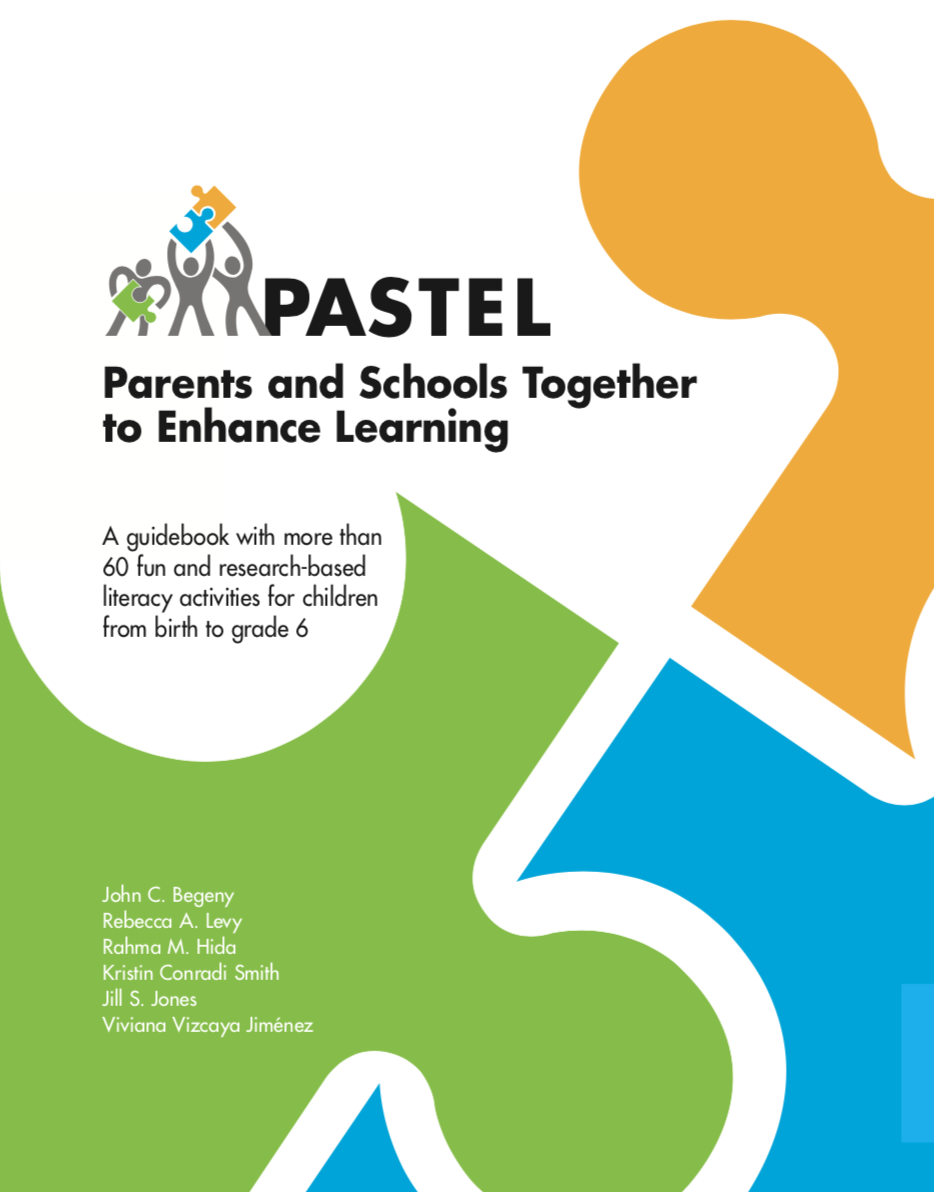Parents and Schools Together to Enhance Learning (PASTEL) Program

On This Page:
Although many parents and caregivers engage their child with reading in the home, many do not know or have access to home-based activities that will best support their child’s literacy development.
The Parents and Schools Together to Enhance Learning (PASTEL) program provides parents and caregivers with 65 fun and easy-to-use activities aimed at improving childrens’ pre-literacy and literacy skills. PASTEL activities are organized by one of the four critical skill areas a child should develop by age 12, including Emergent Literacy (such as language skills and identifying letters), Phonics, Text Reading Fluency, and Comprehension.
The main goals of PASTEL are to:
- Improve children’s emerging and early literacy skills by offering parents/caregivers fun, easy-to-use, and research-based literacy activities that can be used at home
- Increase positive communication between teachers and families in a way that is meaningful, time-efficient, and centered around a child’s developing literacy skills
- Provide parents with helpful information that should enhance their understanding of literacy development, their communication with educators in schools, and their child’s overall success in school
As is described in more detail below, PASTEL is:
- Supported by rigorous research
- Appropriate for children from birth through age 12
- Easy to access
- Feasible to use (parents, caregivers, educators, and community volunteers can implement it effectively and time-efficiently)
Research Supporting the PASTEL Program
To create the PASTEL program, its lead developers and their colleagues (a) drew on their expertise on literacy development and instruction and (b) conducted a thorough search of the relevant research literature to identify evidence-based practices that support emerging and early literacy.
Each PASTEL activity was then tested with numerous parents, teachers, and community volunteers (pilot testers) in a range of different settings, including homes, after-school programs, and childcare centers. Collectively, these pilot testers represented a highly diverse group across a range of characteristics, such as age, race, socio-economic status, marital status, educational background, occupation, etc. Based on careful observation and feedback from pilot testers, data for each activity was reviewed and the activity was accordingly revised, further tested, and enhanced even more based on new data. In short, this type of cyclical process was used until all activities and associated materials were deemed to (a) be feasible and desirable for parents to use, (b) have evidence that it could be used accurately, (c) be fun and engaging for a large number of children, (d) address an important component of early language or literacy, and (e) have the potential to support a child’s learning in that area of literacy. The same cyclical process was used to develop and refine the demonstration videos accompanying each activity, supplemental forms (such as activity tracking forms, communication forms for parents and teachers), and materials for using an optional motivation system.
The PASTEL development process also included some experimental research studies to examine the program and its potential benefit to children, parents, and teachers. Although these studies revealed positive indicators of the program being beneficial, research continues to be conducted with PASTEL to further understand is impact for children, parents, caregivers, and teachers.
Accessing the PASTEL Materials
All program materials are included in the PASTEL Guidebook. The Guidebook explains how to implement the PASTEL program and includes 65 activities for children aged birth through 12. It also includes the reproducible forms and charts needed to implement the program.
For approximately the same cost of printing and assembling the Guidebook yourself, our team at Helping Education can send you a spiral-bound PASTEL Guidebook, including all activities. Not only do parents, caregivers, and teachers find this option convenient, but 100% of proceeds from sales of PASTEL materials go toward our organizational mission—including our ability to develop and freely disseminate even more high-quality educational programs.
If you are interested in purchasing a set of PASTEL activities for a certain age or grade level, please contact us. Otherwise, the button below provides access to the full set of PASTEL activities that can be used wit children from birth through 12.
We send you the spiral-bound Guidebook ready to use. 100% of your purchase supports our mission!
Training for PASTEL Program
Low-Cost Training Workshops
The primary focus of PASTEL trainings is to show parents, caregivers, and educators how to use the program most successfully and to answer all questions. Past attendees of our PASTEL workshops have described them as engaging, informative, fun, and beneficial for getting the most from PASTEL.
Workshops for Parents and Caregivers are specifically designed to show parents, childcare providers, early childhood educators in childcare centers, after-school program staff or volunteers, and all other types of “caregivers” how to implement and benefit most from PASTEL.
Workshops for Professional Educators are similar to the training for Parents and Caregivers, but they are catered to help school-based educators benefit most from PASTEL (such as how to best use and share PASTEL with families of children in your school). We use “professional educator” to refer to classroom teachers, principals, speech-language pathologists, reading specialists, and all other types of professionals who support student learning in school-based settings.
Do-it-Yourself Training
Although we offer trainings on how to most effectively use PASTEL, we know that some parents, caregivers, and educators may not be able to attend a training. Section 1 of the PASTEL Guidebook (pp. 9-62) provides detailed information for using PASTEL and the remaining pages of the Guidebook offer all the activity materials. Each activity in Section 2 of the Guidebook is also accompanied by a video demonstration on YouTube (video links are listed in the Guidebook).
Frequently Asked Questions About PASTEL
Please contact us if you have any questions that are not answered on this page or you simply want to talk with one of our PASTEL experts.
